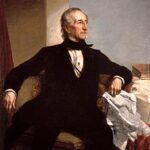The Webster-Ashburton Treaty Decision
President John Tyler faced mounting tensions with Britain over contested borders in 1841. The Webster-Ashburton Treaty negotiations became his administration’s defining diplomatic achievement. Maine’s disputed boundary had sparked the “Aroostook War” bloodless conflict in 1838-1839. Tyler appointed Daniel Webster as Secretary of State to resolve these dangerous territorial disputes.
Diplomatic Breakthrough
Lord Ashburton arrived in Washington representing British interests in spring 1842. The negotiations addressed multiple border issues from Maine to the Great Lakes region. Webster and Ashburton worked through complex territorial claims spanning decades. ⚠️ War seemed possible if negotiations failed, given rising nationalism in both countries. The treaty awarded Maine 7,015 square miles of disputed territory.
Strategic Compromise
Both nations made calculated concessions to achieve lasting peace. Britain retained crucial territory protecting communication routes to Quebec. 📊 The agreement established clear boundaries affecting over 12,000 square miles total. Tyler’s decision prioritized diplomatic resolution over military confrontation. The Webster-Ashburton Treaty set important precedents for international arbitration methods.
Impact:
Immediate Consequences
The Webster-Ashburton Treaty prevented potential military conflict between two powerful nations. Maine residents initially protested losing some claimed territory to British control. Congress ratified the treaty by a narrow Senate margin of 39-9 votes. 🌍 International observers praised the peaceful resolution of complex border disputes. Tyler’s diplomatic success strengthened his political position despite Whig Party opposition.
Long-term Effects on Relations
The treaty fundamentally transformed Anglo-American diplomatic relations for generations. Future border disputes would follow the arbitration model established in 1842. Trade between the United States and Britain expanded significantly after tensions decreased. The agreement resolved the sensitive issue of American slave ships and British search rights. 💰 Economic cooperation flourished as political conflicts diminished between the nations.
Historical Significance
Historians consistently rank the Webster-Ashburton Treaty among Tyler’s greatest presidential achievements. The peaceful resolution demonstrated American diplomatic maturity on the world stage. Modern US-Canada borders still reflect boundaries established through this important agreement. 🔥 The treaty prevented what could have become the third Anglo-American war. Tyler’s decision proved that complex international disputes could be resolved through patient negotiation rather than military force.
